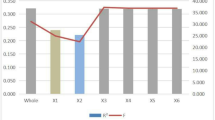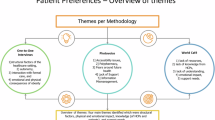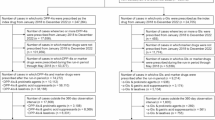Abstract
Background
Gastrointestinal (GI) symptoms are the most frequently reported adverse events of incretin-based Obesity Management Medications (OMMs). There is a lack of comprehensive knowledge and experience regarding the management of GI side effects in patients treated with incretin-based OMMs, highlighting the need to develop practical recommendations. This study aims to gain an in-depth understanding of the perceptions and experiences of patients and healthcare professionals (HCPs) regarding the GI side effects associated with incretin-based OMMs treatment, focusing on the unique perspectives of these two populations.
Methods
A qualitative descriptive research design, including two focus group sessions with seven HCPs (physicians and dietitians) and semi-structured interviews with eight patients who are treated with incretin-based OMMs, was performed. The interviews were analyzed using qualitative content analysis.
Results
Two major themes emerged from the study. The first theme revolves around the different characteristics of GI side effects, encompassing four sub-themes: (1) types of common GI side effects; (2) the timing of GI side effect occurrence; (3) challenges in diagnosis; and (4) their impact on quality of life and treatment continuity. The second theme focuses on strategies for the prevention and management of GI side effects during treatment with incretin-based OMMs encompassing five sub-themes: (1) preliminary education; (2) tailored dose escalation; (3) dietary and lifestyle modifications for the treatment of specific GI symptoms; (4) medical therapy aimed to alleviate symptoms; and (5) multidisciplinary follow-up.
Conclusion
Newly identified characteristics of GI side effects have emerged, enabling a more comprehensive understanding of the phenomenon. Moreover, HCPs proposed detailed strategies for preventing and managing GI side effects. The insights gained could be beneficial for both HCPs and patients aiming to improve the quality of care and medication adherence.
This is a preview of subscription content, access via your institution
Access options
Subscribe to this journal
Receive 12 print issues and online access
$259.00 per year
only $21.58 per issue
Buy this article
- Purchase on SpringerLink
- Instant access to the full article PDF.
USD 39.95
Prices may be subject to local taxes which are calculated during checkout



Similar content being viewed by others
Data availability
The qualitative data generated and analyzed during this study, such as interview transcripts and focus group discussions, are not publicly available due to confidentiality agreements and ethical considerations regarding participant privacy. However, de-identified excerpts relevant to the findings can be made available from the first author upon reasonable request.
References
Wharton S, Lau DCW, Vallis M, Sharma AM, Biertho L, Campbell-Scherer D, et al. Obesity in adults: a clinical practice guideline. CMAJ. 2020;192:E875–91.
Busetto L, Dicker D, Frühbeck G, Halford JCG, Sbraccia P, Yumuk V, et al. A new framework for the diagnosis, staging and management of obesity in adults. Nat Med. 2024;30:2395–99.
Lobstein T, Jackson-Leach R, Powis J, Brinsden H, Gray M. World obesity atlas 2023. World Obes Fed. 2023:5–25. www.johnclarksondesign.co.uk.
Wilding JPH, Batterham RL, Calanna S, Davies M, Van Gaal LF, Lingvay I, et al. Once-weekly semaglutide in adults with overweight or obesity. N Engl J Med. 2021;384:989–1002.
Pi-Sunyer X, Astrup A, Fujioka K, Greenway F, Halpern A, Krempf M, et al. A randomized, controlled trial of 3.0 mg of liraglutide in weight management. N Engl J Med. 2015;373:11–22.
Jastreboff AM, Aronne LJ, Ahmad NN, Wharton S, Connery L, Alves B, et al. Tirzepatide once weekly for the treatment of obesity. N Engl J Med. 2022;387:205–16.
Müllertz ALO, Sandsdal RM, Jensen SBK, Torekov SS. Potent incretin-based therapy for obesity: a systematic review and meta-analysis of the efficacy of semaglutide and tirzepatide on body weight and waist circumference, and safety. Obes Rev. 2024;25:1–19.
Davies M, Færch L, Jeppesen OK, Pakseresht A, Pedersen SD, Perreault L, et al. Semaglutide 2·4 mg once a week in adults with overweight or obesity, and type 2 diabetes (STEP 2): a randomised, double-blind, double-dummy, placebo-controlled, phase 3 trial. Lancet. 2021;397:971–84.
Wadden TA, Bailey TS, Billings LK, Davies M, Frias JP, Koroleva A, et al. Effect of subcutaneous semaglutide vs placebo as an adjunct to intensive behavioral therapy on body weight in adults with overweight or obesity: the STEP 3 randomized clinical trial. J Am Med Assoc. 2021;325:1403–13.
Garvey WT, Batterham RL, Bhatta M, Buscemi S, Christensen LN, Frias JP, et al. Two-year effects of semaglutide in adults with overweight or obesity: the STEP 5 trial. Nat Med. 2022;28:2–5.
Rubino DM, Greenway FL, Khalid U, O’Neil PM, Rosenstock J, Sørrig R, et al. Effect of weekly subcutaneous semaglutide vs daily liraglutide on body weight in adults with overweight or obesity without diabetes: the STEP 8 randomized clinical trial. JAMA. 2022;327:138–50.
Blackman A, Foster GD, Zammit G, Rosenberg R, Aronne L, Wadden T, et al. Effect of liraglutide 3.0 mg in individuals with obesity and moderate or severe obstructive sleep apnea: the scale sleep apnea randomized clinical trial. Int J Obes. 2016;40:1310–9.
Wadden TA, Hollander P, Klein S, Niswender K, Woo V, Hale PM, et al. Weight maintenance and additional weight loss with liraglutide after low-calorie-diet-induced weight loss: the SCALE Maintenance randomized study. Int J Obes. 2013;37:1443–51.
Ghusn W, De La Rosa A, Sacoto D, Cifuentes L, Campos A, Feris F, et al. Weight loss outcomes associated with semaglutide treatment for patients with overweight or obesity. JAMA Netw Open. 2022;5:E2231982.
Aldhaleei WA, Abegaz TM, Bhagavathula AS. Glucagon-like peptide-1 receptor agonists associated gastrointestinal adverse events: a cross-sectional analysis of the National Institutes of Health All of Us Cohort. Pharmaceuticals. 2024;17:199.
Tzoulis P, Batavanis M, Baldeweg S. A real-world study of the effectiveness and safety of semaglutide for weight loss. Cureus. 2024;16:1–12.
Cabral Lopes A, Roque F, Lourenço O, Herdeiro MT, Morgado M. Gastrointestinal disorders potentially associated with Semaglutide: an analysis from the Eudravigilance Database. Expert Opin Drug Saf. 2023;22:455–61. https://doi.org/10.1080/14740338.2023.2172159.
Wharton S, Calanna S, Davies M, Dicker D, Goldman B, Lingvay I, et al. Gastrointestinal tolerability of once-weekly semaglutide 2.4 mg in adults with overweight or obesity, and the relationship between gastrointestinal adverse events and weight loss. Diab Obes Metab. 2022;24:94–105.
Kanoski SE, Hayes MR, Skibicka KP. GLP-1 and weight loss: unraveling the diverse neural circuitry. Am J Physiol Regul Integr Comp Physiol. 2016;310:R885–95.
Horowitz M, Aroda VR, Han J, Hardy E, Rayner CK. Upper and/or lower gastrointestinal adverse events with glucagon-like peptide-1 receptor agonists: Incidence and consequences. Diab Obes Metab. 2017;19:672–81.
Wharton S, Davies M, Dicker D, Lingvay I, Mosenzon O, Rubino DM, et al. Managing the gastrointestinal side effects of GLP-1 receptor agonists in obesity: recommendations for clinical practice. Postgrad Med. 2022;134:14–9. https://doi.org/10.1080/00325481.2021.2002616.
O’Neil PM, Birkenfeld AL, McGowan B, Mosenzon O, Pedersen SD, Wharton S, et al. Efficacy and safety of semaglutide compared with liraglutide and placebo for weight loss in patients with obesity: a randomised, double-blind, placebo and active controlled, dose-ranging, phase 2 trial. Lancet. 2018;392:637–49. https://doi.org/10.1016/S0140-6736(18)31773-2.
Martin AA, Wood R, Leith A, Piercy J, Higgins V. Reasons for discontinuation of GLP1 receptor agonists: data from a real-world cross-sectional survey of physicians and their patients with type 2 diabetes. Diabetes Metab Syndr Obes. 2017;10:403–12.
Lee J, Kim R, Kim MH, Lee SH, Cho JH, Lee JM, et al. Weight loss and side-effects of liraglutide and lixisenatide in obesity and type 2 diabetes mellitus. Prim Care Diab. 2023;17:460–5. https://doi.org/10.1016/j.pcd.2023.07.006.
Trujillo JM, Nuffer W, Smith BA. GLP-1 receptor agonists: an updated review of head-to-head clinical studies. Ther Adv Endocrinol Metab. 2021;12:1–15.
Gorgojo-Martínez JJ, Mezquita-Raya P, Carretero-Gómez J, Castro A, Cebrián-Cuenca A, de Torres-Sánchez A, et al. Clinical recommendations to manage gastrointestinal adverse events in patients treated with Glp-1 receptor agonists: a multidisciplinary expert consensus. J Clin Med. 2022;12:145.
Wadden TA, Chao AM, Moore M, Tronieri JS, Gilden A, Amaro A, et al. The role of lifestyle modification with second-generation anti-obesity medications: comparisons, questions, and clinical opportunities. Curr Obes Rep. 2023;12:453–73.
Almandoz JP, Wadden TA, Tewksbury C, Apovian CM, Fitch A, Ard JD, et al. Nutritional considerations with antiobesity medications. Obesity. 2024;32:1613–31.
Miller T, Reihlen M. Assessing the impact of patient-involvement healthcare strategies on patients, providers, and the healthcare system: a systematic review. Patient Educ Couns. 2023;110:107652. https://doi.org/10.1016/j.pec.2023.107652.
Bradshaw C, Atkinson S, Doody O. Employing a qualitative description approach in health care research. Glob Qual Nurs Res. 2017;4:2333393617742282.
Caelli K, Ray L, Mill J. Clear as mud’: toward greater clarity in generic qualitative research. Int J Qual Methods. 2003;2:1–13.
Tong A, Sainsbury P, Craig J. Consolidated criteria for reporting qualitative research (COREQ): a 32-item checklist for interviews and focus groups. Int J Qual Heal Care. 2007;19:349–57.
Kallio H, Pietilä AM, Johnson M, Kangasniemi M. Systematic methodological review: developing a framework for a qualitative semi-structured interview guide. J Adv Nurs. 2016;72:2954–65.
Polit DF, Beck CT. Sampling in quantitative research. In: Nursing research: generating and assessing evidence for nursing practice. 10th ed. Lippincott Williams & Wilkins; 2018. pp. 365–88.
Hsieh HF, Shannon SE. Three approaches to qualitative content analysis. Qual Health Res. 2005;15:1277–88.
Fereday J, Muir-Cochrane E. Demonstrating rigor using thematic analysis: a hybrid approach of inductive and deductive coding and theme development. Int J Qual Methods. 2006;5:80–92.
Henderson Lewis K, Sloan CE, Bessesen DH, Arterburn D. Effectiveness and safety of drugs for obesity. BMJ. 2024;25:1–17.
Singh P, Nee J. Role of diet in diarrhea-predominant irritable Bowel syndrome. J Clin Gastroenterol. 2021;55:25–9.
Halmos EP, Gibson PR. Controversies and reality of the FODMAP diet for patients with irritable bowel syndrome. J Gastroenterol Hepatol. 2019;34:1134–42.
Mckenzie YA, Bowyer RK, Leach H, Gulia P, Horobin J, Sullivan NAO, et al. British Dietetic Association systematic review and evidence-based practice guidelines for the dietary management of irritable bowel syndrome in adults (2016update). J Hum Nutr Diet. 2016;29:549–75.
Milosavljevic T, Popovic DD, Mijac DD, Milovanovic T, Krstic S, Krstic MN. Chronic constipation: gastroenterohepatologist’s approach. Dig Dis. 2022;40:175–80.
Harper AE. Dietary guidelines for Americans. Am J Clin Nutr. 1981;34:121–3.
İnce Palamutoglu M, Köse G, Bas M. Probiotics and prebiotics affecting mental and gut health. Healthcare. 2024;12:510.
Effect of a fermented milk containing Bifidobacterium animalis DN-173 010 on the health-related quality of life and symptoms in irritable bowel syndrome in adults in primary care: a multicentre, randomized, double-blind, controlled trial. Aliment Pharmacol Ther. 2007;26:475–86.
Soltanian N, Janghorbani M. Effect of flaxseed or psyllium vs. placebo on management of constipation, weight, glycemia, and lipids: a randomized trial in constipated patients with type 2 diabetes. Clin Nutr ESPEN. 2019;29:41–8. https://doi.org/10.1016/j.clnesp.2018.11.002.
Vriesman MH, Koppen IJN, Camilleri M, Di Lorenzo C, Benninga MA. Management of functional constipation in children and adults. Nat Rev Gastroenterol Hepatol. 2020;17:21–39. https://doi.org/10.1038/s41575-019-0222-y.
Stanghellini V, Chan FKL, Hasler WL, Malagelada JR, Suzuki H, Tack J, et al. Gastroduodenal disorders. Gastroenterology. 2016;150:1380–92.
Limketkai BN, LeBrett W, Lin L, Shah ND. Nutritional approaches for gastroparesis. Lancet Gastroenterol Hepatol. 2020;5:1017–26. https://doi.org/10.1016/S2468-1253(20)30078-9.
Marx W, Kiss N, McCarthy AL, McKavanagh D, Isenring L. Chemotherapy-induced nausea and vomiting: a narrative review to inform dietetics practice. J Acad Nutr Diet. 2016;116:819–27. https://doi.org/10.1016/j.jand.2015.10.020.
Gigliotti L, Warshaw H, Evert A, Dawkins C, Schwartz J, Susie C, et al. Incretin-based therapies and lifestyle interventions: the evolving role of registered dietitian nutritionists in obesity care. J Acad Nutr Diet. 2024. https://doi.org/10.1016/j.jand.2024.10.023.
Crichton M, Davidson AR, Innerarity C, Marx W, Lohning A, Isenring E, et al. Orally consumed ginger and human health: an umbrella review. Am J Clin Nutr. 2022;115:1511–27. https://doi.org/10.1093/ajcn/nqac035.
Bischoff SC, Renzer C. Nausea and nutrition. Auton Neurosci Basic Clin. 2006;129:22–7.
Ford CK. Nutrition considerations in patients with functional diarrhea. Curr Gastroenterol Rep. 2023;25:198–203. https://doi.org/10.1007/s11894-023-00878-5.
Abraham B, Sellin JH. Drug-induced Diarrhea. Curr Gastroenterol Rep. 2007;9:365–72.
Qin W, Yang J, Deng C, Ruan Q, Duan K. Efficacy and safety of semaglutide 2.4 mg for weight loss in overweight or obese adults without diabetes: an updated systematic review and meta-analysis including the 2-year STEP 5 trial. Diab Obes Metab. 2024;26:911–23.
Imhagen A, Karlsson J, Jansson S, Anderzén-Carlsson A. A lifelong struggle for a lighter tomorrow: a qualitative study on experiences of obesity in primary healthcare patients. J Clin Nurs. 2023;32:834–46.
Astrup A, Rössner S, Van Gaal L, Rissanen A, Niskanen L, Al Hakim M, et al. Effects of liraglutide in the treatment of obesity: a randomised, double-blind, placebo-controlled study. Lancet. 2009;374:1606–16.
Lincoff AM, Brown-Frandsen K, Colhoun HM, Deanfield J, Emerson SS, Esbjerg S, et al. Semaglutide and cardiovascular outcomes in obesity without diabetes. N Engl J Med. 2023;389:2221–32.
Perkovic V, Tuttle KR, Rossing P, Mahaffey KW, Mann JFE, Bakris G, et al. Effects of semaglutide on chronic kidney disease in patients with type 2 diabetes. N Engl J Med. 2024;391:109–21.
Acknowledgements
We would like to thank HCPs and patients who participated in the study and contributed their time, experiences, and insights.
Funding
This study was supported by an independent research grant from Novo Nordisk. The funder was not involved in the study design, collecting, and analyzing the data, writing the report, and submitting this paper for publication.
Author information
Authors and Affiliations
Contributions
Conceptualization: RR, SSD and GG; methodology: RR SSD and GG; formal analysis: RR, SSD and GG; data curation: RR; writing—original draft preparation: RR, SSD and GG; writing—review and editing: MB, ID, AR, TPG, and AB; project administration: SSD; funding acquisition: SSD and AB. All authors have read and agreed to the published version of the manuscript.
Corresponding author
Ethics declarations
Competing interests
The authors declare no competing interests.
Ethical approval
This study was approved by the institutional ethical review board of Ariel University (approval number AU-HEA-SS-20231016). Before data collection, all participants provided informed verbal consent, which was documented and recorded by the interviewer. The researchers ensured the confidentiality of information and anonymous reporting of the data. All methods were performed in accordance with the relevant guidelines and regulations.
Additional information
Publisher’s note Springer Nature remains neutral with regard to jurisdictional claims in published maps and institutional affiliations.
Supplementary information
Rights and permissions
Springer Nature or its licensor (e.g. a society or other partner) holds exclusive rights to this article under a publishing agreement with the author(s) or other rightsholder(s); author self-archiving of the accepted manuscript version of this article is solely governed by the terms of such publishing agreement and applicable law.
About this article
Cite this article
Refaeli, R., Green, G., Boaz, M. et al. Gastrointestinal side effects of incretin-based obesity management medications: insights from healthcare professionals and patients’ experiences. Int J Obes 49, 2484–2493 (2025). https://doi.org/10.1038/s41366-025-01887-2
Received:
Revised:
Accepted:
Published:
Version of record:
Issue date:
DOI: https://doi.org/10.1038/s41366-025-01887-2



